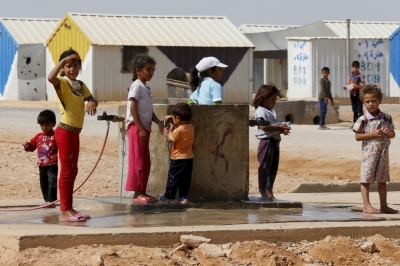Where in the World Is the Refugee Crisis?

A look at the people called "refugees" and the places they live
Daniel still remembers the screams — sharp cries, punctuated by the sound of gunfire. He remembers the way the ground cut his feet as he ran from the village. The scars are still there, physically and emotionally. They remind him of the day the militia came to his home ... the day that changed his life forever.
Daniel is just one of the 65 million refugees around the world who have lost everything. Like most refugees, Daniel lived a relatively normal life before the militia arrived. He had a family, friends, and a home. He helped out in his village by pulling weeds and tilling the soil. He was just a normal 12-year-old boy living in South Sudan.
But like most refugees, normal came to an abrupt end when he was forced to leave everything behind.
The dictionary defines a refugee as "one that flees." This broad definition does little to describe why people leave and where they go. Each refugee's story is unique; however, they all have one thing in common: they have all been uprooted from their homes and they are all desperate for help.
What makes a refugee?
You've probably heard a few different terms when it comes to describing the global refugee crisis. You may wonder what the difference is between a refugee and an asylum seeker. Or perhaps, what does it mean when the media talks about displaced people?
In 1951, the United Nations held a Refugee Convention; 145 state parties agreed that a refugee was someone who "owing to well-founded fear of being persecuted for reasons of race, religion, nationality, membership of a particular social group or political opinion, is outside the country of his nationality ... or, owing to such fear, is unwilling to return to it." In short, a person becomes a refugee the moment he leaves his country due to a fear of persecution.
However, this definition does not include every type of refugee.
An asylum seeker is someone whose refugee status has not yet been determined by the government. For example, most individuals who flee their home country because of famine, natural disasters, or civil disturbance would legally be considered asylum seekers. Although they technically could have remained in their country, most asylum seekers leave because they consider their home to be dangerous for one reason or another.
The same is true for the displaced. The term "displaced people" generally refers to those who have fled their homes but remain in their country. In Nigeria, more than 2 million people ran from their villages to escape the attacks of terrorist groups like Boko Haram. However, the majority of these people still live in Nigeria. Rather than leaving, they have relocated to refugee camps closer to the major cities.
Regardless of why they fled or their current status, these people are all refugees. They are men, women, and children just like you and your family.
Where do refugees go?
There are pockets of refugees living around the world, but certain countries are more affected than others. Here are a few countries housing large populations of refugees.
- Turkey — more than 3 million refugees have fled from Syria into Turkey. Most are unsure where they will go next.
- Uganda — over 1.2 million South Sudanese now reside in refugee camps in the northern part of the country.
- Iraq — over 3 million people have been internally displaced. Most live in overcrowded refugee camps.
- Greece and Macedonia — once considered the gateway to Europe, these two countries now host more than 1 million refugees ... most from the Middle East. Borders have been closed, and many refugees are stuck for the foreseeable future.
- Colombia — at least 250,000 Venezuelan refugees have come to this neighboring country to escape their nation's catastrophic economic collapse and food crisis.
What do they need?
No matter where they live, every refugee has faced considerable trauma. They have seen things you and I can hardly even imagine. Some left just as bombs began to rain on their city. Others ran to escape violent attacks. But every one of them has made the choice to fight and survive. They risked their lives and crossed dangerous waters, roads, and country borders. All they want is safety and peace for their families.
But there's a problem. Many of these refugees now live in overcrowded camps or settlements. The rations provided by government aid groups simply aren't enough. They are hungry, they are thirsty, and many have come so far only to fall prey to infection or disease.
But together, we can help refugees like Daniel survive.
The first thing we can do is pray. Pray for their safety, and pray that they will continue to have courage to face whatever comes next. You can also pray about how God would have you personally get involved and help refugees.
For our organization, World Help, that looks like providing necessities such as food, clean water, and medical aid. Our donors have saved the lives of countless refugees by giving these simple items. But the work in Uganda, Syria, and other refugee camps worldwide isn't done ... and it won't be until we all come together to help the men, women, and children whose lives have been taken away from them by violence and war.
Now that you know more about these people called "refugees," what will you do to help?





















